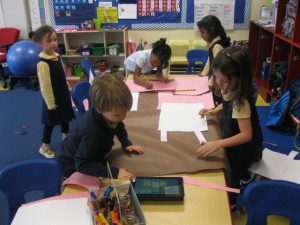In honor of Black History Month, our class used our most recent Life and Community Project time to research impactful African-American leaders. We spent the week introducing our students to 5 leaders (Dr. Martin Luther King Jr., Misty Copeland, Cam Newton, Tracy Reese and Ben Carson) and had each student decide who they wanted to learn more about. Our essential question was, what makes someone a leader? Once had chosen a leader to research, it automatically formed small groups. Their experience entailed working with a teacher to learn what they could about each leader, creating a life size figure of that leader and writing words to describe how that person is or was a leader. My co-teacher and I look forward to giving our students regular and intentional opportunities to collaborate and this is something we do well at Trinity!
 As my co-teacher and I crossed paths while floating from group to group, she shared with me the details of an interaction between two of our students. One student was expressing how she thought their leader, Tracy Reese, should look and after listening for quite some time, the other student finally shouted, “Stop commanding me! You’re commanding me!” We smiled at each other and were proud of both of our students as they were able to continue to work on their project without teacher or peer intervention and with a better understanding for each other and what needed to happen in order to make their project a success. As I continued to listen to other groups around the room I couldn’t stop about this very blog post!
As my co-teacher and I crossed paths while floating from group to group, she shared with me the details of an interaction between two of our students. One student was expressing how she thought their leader, Tracy Reese, should look and after listening for quite some time, the other student finally shouted, “Stop commanding me! You’re commanding me!” We smiled at each other and were proud of both of our students as they were able to continue to work on their project without teacher or peer intervention and with a better understanding for each other and what needed to happen in order to make their project a success. As I continued to listen to other groups around the room I couldn’t stop about this very blog post!
I believe that there are two things that have a significant impact on collaborative experiences in school. Teachers MUST model the vocabulary, tone of voice and body language that is appropriate and effective when working with others. This can happen everyday and in several different situations! For example, student-teacher conferences during writing, reading and math or when talking with a student about correcting an unacceptable behavior. When modeling good collaborative skills, show that you can be a good listener, express your ideas and feelings in a way that shows your serious, but doesn’t make the student feel unwanted, unheard or under appreciated. These are just some of the things that we want students to embody when working with a partner or in a group. Secondly, students NEED opportunities to practice collaboration skills very early on in their educational journey. I have noticed a big push for our children to be strong, independent and to be leaders. Unfortunately, sometimes these qualities can appear to take the form of bossiness and not recognizing the way others may feel or react to their “leadership.” Collaborating often and in meaningful ways will give our young students the time and practice to be leaders in a way that is more mindful and inclusive of everyone involved.
Learner, Thinker, Writer: Nicole King (@NIcoleNKing) serves the Trinity School community as a Kindergarten Teacher.
Thank you for teaching these important cooperation skills! You are doing such a service for your students and for their future teachers!
Nicole,
I love that you have highlighted the need to practice collaborating. Skills of all kinds are built with practice coupled with feedback.
I somehow missed when you originally posted, but this past week I was roaming the halls of downstairs and was immediately drawn to you and Julia’s bulletin board. I love reading this post and now better understanding what the students were charged to do and the cooperative skills they were learning and practicing through this project. Thank you so much for reminding us to give students time to practice these skills, as well as remind us to model these skills through our own feedback.